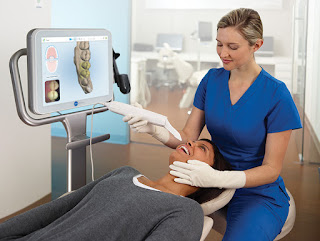 |
| Floss, various types are available |
Did you know that only 31% of
people in the UK floss between their teeth, and only 5% of people do it
regularly? It’s a startling figure, we know, especially since it’s pretty
likely that your
dentist tells you to floss at every appointment. As they
should – the NHS suggests that everyone over the age of 12 should floss (or use
interdental brushes if they prefer) every day as part of their oral health
routine. So why is it that so many people avoid the minty-tasting white string?
Well, it turns out that there are a lot of misconceptions and misinformation
out there about flossing. And you know how much we like to bust a good myth,
especially if it’s around oral hygiene. So today, we thought we’d bring you the
truth and the lies around flossing.
Myth 1:
Flossing Is Painful
Flossing shouldn’t hurt. If
you’re using the right type of floss and your mouth is healthy, then you
shouldn’t experience any pain at all. True, if you have gum disease then
flossing can feel a little uncomfortable when you first start, but after a
while it will feel more normal. If you’re experiencing pain when flossing, you
should make an appointment to see your dentist.
Myth 2: I
Should Only Floss When I Have Something Stuck In My Teeth
A lot of people will only break
out the dental floss when they have something stuck between their teeth and
it’s driving them crazy. And flossing is a great way to remove trapped
particles from in-between your teeth, that much is true. But it’s not the only
reason you should floss. For one, you are more likely to get things stuck
between your teeth if you have built up plaque blocking the gaps and causing
tightness. Flossing removes the plaque and prevents tooth decay (and things
getting stuck).
Myth 3:
Flossing Will Make My Receding Gums Worse
 |
| You can also use Interdental Brushes |
If you have receding gums, you
might be too scared to floss in case it makes them worse. This is the last
thing you want, and we completely understand this fear. But thankfully there is
no truth to that myth at all. In fact, regular flossing can actually prevent
your gums from receding further, since it helps clear out food particles and
bacteria from below the gumline. So if you have gingivitis, gum disease or
receding gums, flossing is actually a more crucial part of your oral health
routine than most.
Myth 4: I
Shouldn’t Floss Because I Have Braces
Braces make flossing a
challenging task, and a lot of people end up giving up and just not flossing
while they have braces. But this is a really bad idea. Giving up on flossing for
months or even years can lead to some nasty discoveries when you have the
braces off. Just imagine all the food particles and bacteria in-between your
teeth when you have them taken off! Or, look at it another way – there is no
point in straightening your teeth if they’re not going to be healthy when your
braces are removed.
Myth 5: My
Teeth Are Too Tight To Floss Properly
This is something we hear a lot.
If you have tight teeth with very little space in-between, the flossing can be
a bit more of a challenge. But that doesn’t mean you shouldn’t do it at all.
Instead, you just need to change your technique a little. A good tip for
flossing tight teeth is to use a see-sawing motion to get the floss between
your teeth. You could also try a waxed floss, which will slide between your
teeth easier, and opting for a thinner floss will help too.
Truth!
Flossing is an important part of
your oral hygiene routine, and we dentists recommend it for a reason. It helps
remove bacteria from your mouth and keeps plaque from building up between your
teeth, causing problems. It can also help treat some dental conditions, like
receding gums and gingivitis, and can prevent bad breath and even tonsil
stones. If you’re not sure how to floss properly, or you’re struggling to find
a way that works for you, talk to your dentist or hygienist. They will be happy
to demonstrate the techniques to you and even recommend products that will
help.
To transform your smile, contact Appledore Dental Clinic Milton Keynes and you will start smiling more




















